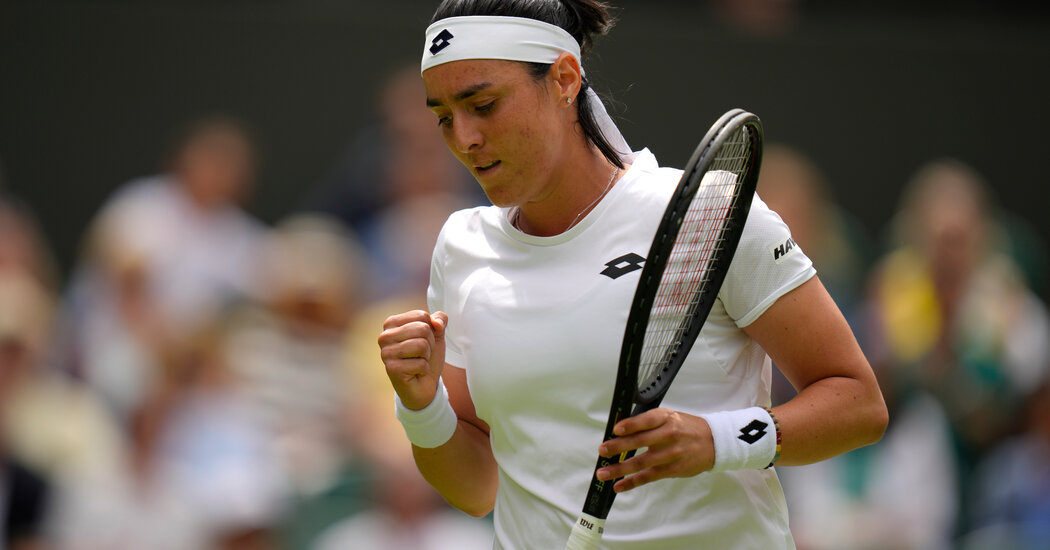
WIMBLEDON, England — In Tunisia, her home nation and inspiration, Ons Jabeur has acquired the nickname “The Minister of Happiness.”
Though there have been plenty of dark and down times along her rare and winding path to Saturday’s Wimbledon singles final, she was spreading the joy around the All England Club on Thursday.
Up on Henman Hill, the Guizanis, a Tunisian family living in London, cheered from their picnic blanket on the sloping lawn as Jabeur defeated Tatjana Maria of Germany, 6-2, 3-6, 6-1, to become the first Arab or African woman to reach a Grand Slam singles final in the Open era, which began in 1968.
“It’s very important for women to be successful, to play sports,” said Ibtissem Guizani, who was attending Wimbledon for the first time with her husband Zouhaeir and their 4-year-old son, and was dressed in red in honor of Jabeur and Tunisia.
“We see ourselves in Ons,” she continued. “And she makes us proud of her and proud of us.”
The second-ranked Jabeur and the 103rd-ranked Maria had used the whole grand canvas in their semifinal match on Centre Court: They ventured frequently into the lush, underutilized grass in the forecourt as they chopped approach shots and rushed the net; pounded overheads; or caressed deft drop volleys.
It was old school but hardly passé, and the crowd responded with roars and murmurs, not only because of their element of surprise and novelty, but because of their panache.
Jabeur, in particular, relishes exploring the range of shotmaking possibilities in a manner reminiscent of Roger Federer, to whom she has been compared since she was 12 years old. Like Federer, Jabeur does not simply play the ball. She plays with it and not only with her strings. Let a tennis ball land near her feet, and her soccer juggling skills quickly become apparent, too.
She is an entertainer who may soon be a Grand Slam tournament champion if she can get past Elena Rybakina in Saturday’s final, but she was not so wrapped up in her win on Thursday to forget about Maria, her good friend.
Moments after Jabeur’s victory, she insisted on sharing the spotlight instead of taking the normal tack and saluting the crowd on her own. She clasped Maria by the wrist and pulled her back onto the court despite her protestations and pointed appreciatively in her direction to acknowledge Maria’s own unexpected journey to this semifinal as an unseeded 34-year-old mother of two young children.
“She’s such an inspiration for so many people, including me, coming back after having two babies,” Jabeur said. “I still can’t believe how she did it.”
Jabeur, 27, has worked hard on believing in herself. She came from a country and region that had produced some professional women’s players — including Selima Sfar, a Tunisian who reached a top ranking of 75 in 2001 — but had never produced a talent capable of challenging for the biggest prizes.
Jabeur has worked with sports psychologists since her teens and has developed a particularly fruitful connection in recent years with Melanie Maillard, a Frenchwoman introduced to her by Sfar, who has worked with French tennis players and other athletes for more than 20 years.
“I’m very lucky that I found the right person that could push me through and know me much better,” Jabeur said. “It’s all about the connection. We did a great job, and we’ve come a long way.”
Maillard was not at this year’s French Open, where Jabeur, one of the favorites, was upset in the first round. But Jabeur has long planned on having Maillard back with her at Wimbledon. She was with Jabeur last year when she reached the quarterfinals, finally fell in love with grass-court tennis and told Maillard, “I’m coming back for the title.”
Now, she is just one match away.
“It’s rare that someone dares to say it and dares to accept it,” Maillard said on Thursday at Wimbledon. “Ons was once a shy young woman. She matured through effort and by questioning herself and searching constantly for better approaches and solutions. She is very open in spirit and has a family who support her a lot. She has a husband who accepted to leave everything behind for her, to follow her everywhere, and that’s powerful, too.”
Jabeur, born in the coastal town of Ksar Hellal in Tunisia, grew up in a family of four children playing on courts at local hotels and a local club. Though her all-around athletic talent had coaches in other sports like soccer and team handball trying to lure her away, she stuck with tennis and left to train and study at a sports school in Tunis, the capital, at age 13.
Jabeur, with her quick wit, was a fan in her youth of Andy Roddick and used to pretend as she trained that she was Kim Clijsters or Serena or Venus Williams.
She won the French Open junior title at 16 and has spent time training in Belgium and France but has long been back in Tunisia, where she lives with her husband, Karim Kamoun, who is also her fitness trainer. She remains deeply connected to the country.
“Now tennis is like soccer in Tunisia, people are following my matches,” Jabeur said in a recent interview. “And that I appreciate so much, and I appreciate that tennis is becoming more popular. What has always been missing is the thing that we have to believe more we can do it, no matter where you come from.”
Her lifelong attachment to Tunisia is quite a contrast with Rybakina, her surprise opponent in Saturday’s final. Rybakina, born in Moscow and long considered a promising Russian junior, began representing Kazakhstan four years ago while continuing to train regularly in Moscow.
A vast former Soviet republic, Kazakhstan has recruited several top-flight Russian players since gaining independence and provided talents like Rybakina with the major funding and support they were often lacking.
Though Wimbledon has barred Russian and Belarusian players from this year’s tournament because of Russia’s invasion of Ukraine, the ban does not apply to Rybakina, a 23-year-old who became Kazakhstan’s first Grand Slam singles finalist on Thursday by overwhelming the 2019 Wimbledon champion Simona Halep, 6-3, 6-3.
“I’m playing already for Kazakhstan for a long time,” Rybakina said, pointing out that she has represented the country at the Olympics and in the Billie Jean King Cup team competition.
“I’m really happy representing Kazakhstan,” she said. “They believed in me. There is no more question about how I feel.”
Asked if she still felt Russian in her heart, Rybakina responded, “What does it mean for you to feel? I mean, I’m playing tennis, so for me, I’m enjoying my time here. I feel for the players who couldn’t come here, but I’m just enjoying playing here on the biggest stage, enjoying my time and doing my best.”
With her huge serve, long reach and penetrating baseline power, the 17th-seeded Rybakina could be a formidable obstacle for Jabeur. This will be the first Wimbledon women’s final in the Open era between two players without a Grand Slam singles title, and neither Rybakina nor Jabeur had been past the quarterfinals at a major in singles until now.
Saturday’s final comes on the same day as much of the Muslim world, including Tunisia, begins celebrating the holiday of Eid al-Adha.
“If I make it on that special holiday, one of my favorite actually, it’s going to be great,” Jabeur said.
The Guizanis, part of her growing Tunisian fan club, plan to be back on Henman Hill on Saturday.
“We’re going to celebrate with Ons, inshallah,” Ibtessem Guizani said.




